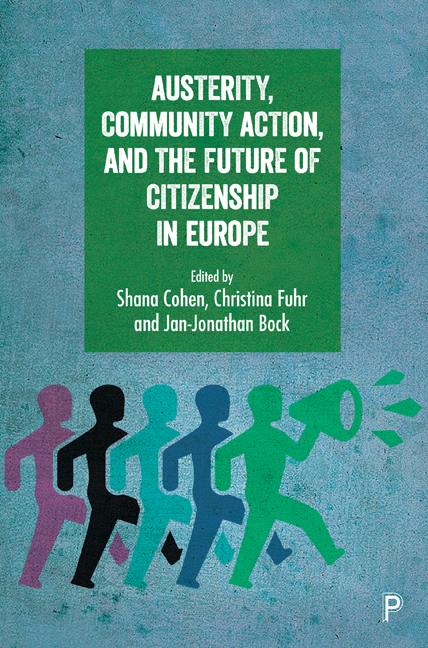Book contents
- Frontmatter
- Dedication
- Contents
- Acknowledgements
- Notes on contributors
- one Introduction: social activism, belonging and citizenship in a period of crisis
- Part I The social consequences of welfare policy
- Part II The practice of social good
- Part III Social change and neoliberalism
- Part IV Situating solidarity in perspective
- Index
Thirteen - Challenges for the struggle against austerity in Britain and Europe
Published online by Cambridge University Press: 05 April 2022
- Frontmatter
- Dedication
- Contents
- Acknowledgements
- Notes on contributors
- one Introduction: social activism, belonging and citizenship in a period of crisis
- Part I The social consequences of welfare policy
- Part II The practice of social good
- Part III Social change and neoliberalism
- Part IV Situating solidarity in perspective
- Index
Summary
We live in a time of unprecedented wealth and opulence, concentrated in very few hands, a plutocratic age. It is also a time of acute capitalist crisis, in which clear signs of systemic irrationality abound. The clearest of these is imminent ecological catastrophe, and the unsustainability of a global political economy that mandates infinite growth but is based on the exploitation of scarce natural resources. Moreover, around the globe, abject misery persists among multitudes, while perpetual war for the sake of perpetual peace surrounds us. Endemic and polarising violence and destruction are careening out of control in the context of the Orwellian ‘War on Terror’, while civil liberties are slashed, to the detriment of all. Nevertheless, capitalist social-property relations go virtually uncontested, albeit not without exception, but to a degree certainly unthinkable before the end of the Cold War. Our political imagination has been impoverished by the crimes of Stalin and by decades of neoliberal assault. The mantra ‘There is no alternative’ (Thatcher, 2013) is broadcast ad infinitum, consubstantiated into common sense. Subliminal mind games we are up against, the white magic of Walt Disney and the New Reagan Man.
We have lost our faith in a viable and desirable alternative to the existing social order. And make no mistake, resistance requires faith – faith that resistance is not futile; faith that resistance will not make things even worse. Our conviction in the emancipatory outcome of – especially anti-capitalist – political struggle has been shaken to its foundations. It's not just that faith in the inevitable victory of socialism over barbarism has vanished, it's much worse than that. The very distinction between the two has been thrown into question by the millions who perished in the gulags, not to mention the axe in Trotsky's skull.
In turn, the crisis and collapse of the Soviet Union – and with it, the death of the state communist ideal – has triggered a crisis of social democracy as well. The model of ‘social democracy’ – a model even embedded in the constitutions of many European states – gives way nearly everywhere to the logic of austerity and the mandate of neoliberal reform (Streeck, 2014).
- Type
- Chapter
- Information
- Austerity Community Action and the Future of Citizenship , pp. 217 - 236Publisher: Bristol University PressPrint publication year: 2017

